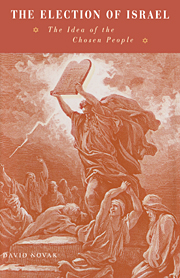Book contents
- Frontmatter
- Contents
- Preface
- List of abbreviations
- General note
- Introduction
- 1 Spinoza and his challenge
- 2 Hermann Cohen's concept of election
- 3 Franz Rosenzweig's return to the doctrine
- 4 The retrieval of the biblical doctrine
- 5 The rabbinic development of the doctrine
- 6 Two medieval views of election
- Conclusion
- Appendix 1 Some major Jewish thinkers cited
- Appendix 2
- Appendix 3
- Appendix 4
- Bibliography
- Index
6 - Two medieval views of election
Published online by Cambridge University Press: 18 December 2009
- Frontmatter
- Contents
- Preface
- List of abbreviations
- General note
- Introduction
- 1 Spinoza and his challenge
- 2 Hermann Cohen's concept of election
- 3 Franz Rosenzweig's return to the doctrine
- 4 The retrieval of the biblical doctrine
- 5 The rabbinic development of the doctrine
- 6 Two medieval views of election
- Conclusion
- Appendix 1 Some major Jewish thinkers cited
- Appendix 2
- Appendix 3
- Appendix 4
- Bibliography
- Index
Summary
TIME AND ETERNITY
The doctrine of the election of Israel, both as originally presented in Scripture and then developed by the Rabbis, is only philosophically cogent if one assumes that it designates a temporal relation. Real choice involves two or more objects being present to the elector and that one of them is elected at a certain time as distinct from any other time. The freedom that choice presupposes (“unfree” choice being a contradiction in terms) makes choice a practical rather than a theoretical issue. It is the concern of the realm of politics, taken in the broad classical sense that denotes the locus of free and purposeful public action between persons. It is not the concern of the realm of science per se, which describes the necessary behavior of entities.
Accordingly, election is historical, that is, it is a humanly remembered temporal event, characterized by freedom rather than by necessity. And, even though I have argued elsewhere that there are natural limits that must be recognized a priori in order for there to be communities in which covenantal history may occur and be sustained, these limits only make that history possible; it itself cannot be reduced to these limits as mere instantations of perpetual natural law. These natural limits are the conditio sine qua non of covenantal history, not its conditio per quam. History as the arena of free personal action involves novelty in a way that nature does not. For in our constitution of nature, we see time as one continuum extending from past to present to future: the realm of causality.
- Type
- Chapter
- Information
- The Election of IsraelThe Idea of the Chosen People, pp. 200 - 240Publisher: Cambridge University PressPrint publication year: 1995



